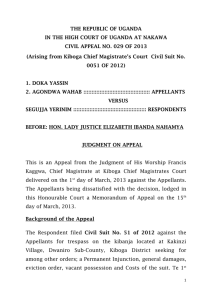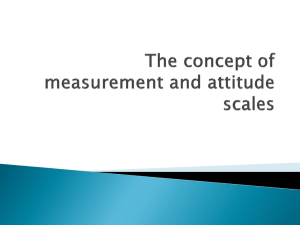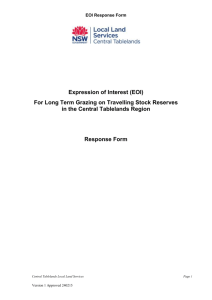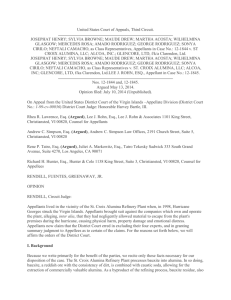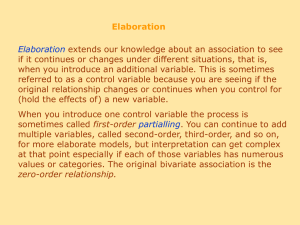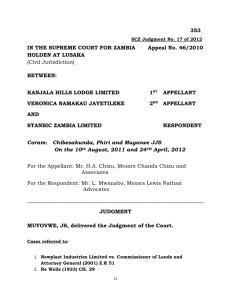24. JUDGMENT BETWEEN REGINA CHISENGA AND
advertisement
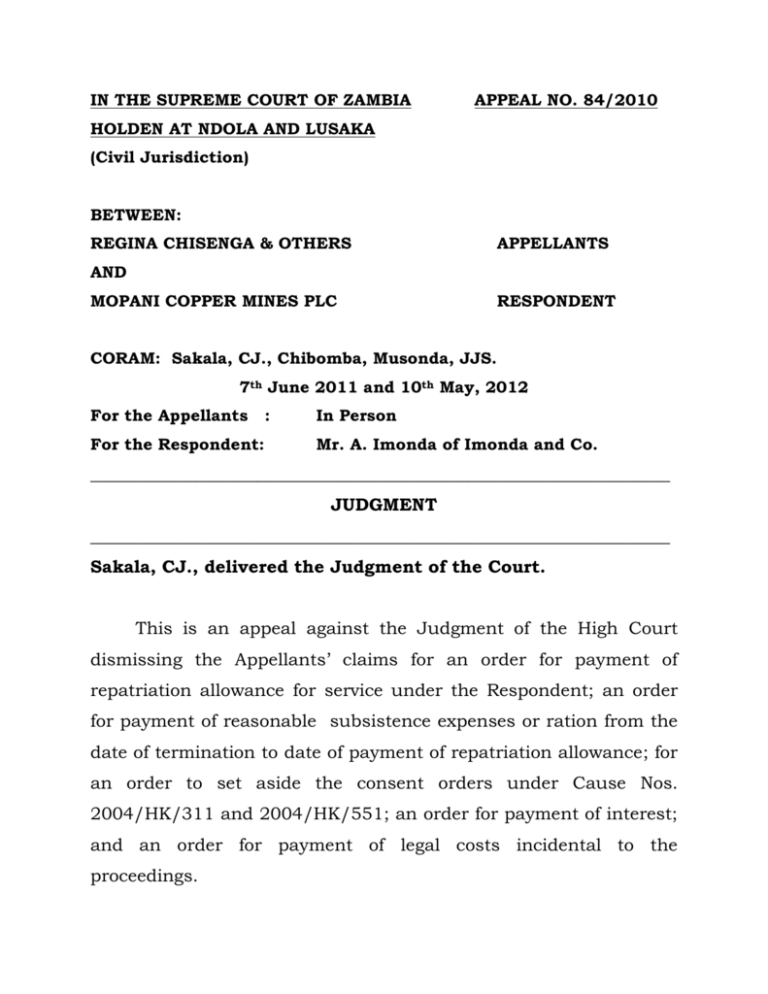
IN THE SUPREME COURT OF ZAMBIA APPEAL NO. 84/2010 HOLDEN AT NDOLA AND LUSAKA (Civil Jurisdiction) BETWEEN: REGINA CHISENGA & OTHERS APPELLANTS AND MOPANI COPPER MINES PLC RESPONDENT CORAM: Sakala, CJ., Chibomba, Musonda, JJS. 7th June 2011 and 10th May, 2012 For the Appellants For the Respondent: : In Person Mr. A. Imonda of Imonda and Co. __________________________________________________________________ JUDGMENT __________________________________________________________________ Sakala, CJ., delivered the Judgment of the Court. This is an appeal against the Judgment of the High Court dismissing the Appellants’ claims for an order for payment of repatriation allowance for service under the Respondent; an order for payment of reasonable subsistence expenses or ration from the date of termination to date of payment of repatriation allowance; for an order to set aside the consent orders under Cause Nos. 2004/HK/311 and 2004/HK/551; an order for payment of interest; and an order for payment of legal costs incidental to the proceedings. J2 The facts of this appeal are not indispute. The Appellants were employed by ZCCM on various dates and in various capacities. Later, upon the privatization of ZCCM, the Appellants were transferred to the Respondent Company, who offered them employment on the same terms and conditions that applied to them; when they were ZCCM employees. The benefits that the Appellants earned, whilst working with ZCCM, were calculated and held in Trust to be paid to the Appellants; when they separated with the Respondent. Later, the Appellants received similarly worded letters from the Respondent declaring them redundant. Subsequently, the Appellants commenced an action by writ of summons in the High Court at Kitwe claiming for the orders set out above. At trial, Mr. William Chola gave evidence on his behalf and on behalf of the other Appellants. In his evidence, he testified that the Appellants left employment on various grounds ranging from medical discharge, normal retirement and retrenchments. They were all claiming repatriation allowance, as per their conditions of service. According to the witness, when leaving ZCCM, repatriation allowance was calculated and all the Appellants were paid that allowance; that when they were employed by the Respondent, the same conditions, which they were enjoying under ZCCM, were to apply. He denied that the Appellants were claiming repatriation allowance twice. J3 On behalf of the Respondent, Mr. Oscar Matabele, the head of employee Relations in the Respondent company, testified that his job entailed dealing with handling of disputes and attending to employees conditions of service. He also testified that he was employed by the Respondent on 1st April, 2000, on transfer from ZCCM and that he was familiar with this case. He explained that the Appellants were former employees of the Respondent; that the terminal benefits with ZCCM were calculated and transferred to the Respondent as a liability to them. He further testified that the value of service and repatriation was 28 months pay plus one month pay for each year of service, which included repatriation. He further explained that the Appellants were terminated through various modes retrenchments; such while as some redundancy, were medical summarily discharge, dismissed. He explained further that upon termination, the affected employees were paid terminal benefits from ZCCM in Trust Fund, which included repatriation which the Appellants were paid by the Respondent on their termination. The witness explained further that the Appellants’ services continued on being transferred from ZCCM to the Respondent and the benefits only became payable on termination of employment. The learned trial Judge considered the oral and documentary evidence before him. He found that there was no dispute that the Appellants were previously employed by ZCCM in various capacities; that ZCCM was privatized; that the Appellants were J4 transferred to the Respondent and advised that they would continue to enjoy the same conditions of service as those enjoyed under ZCCM; and that they were all written similar letters containing similar conditions. The trial Court reproduced in full a letter dated 24th February, 2000, written by ZCCM to each of the Appellants on the subject of Transfer of Employment from ZCCM to the Respondent Company. The Court also reproduced in full the letter by the Respondent, written on the same date, offering each of the Appellants employment with the Respondent. Again the Court reproduced in full the notices of termination dated 19th October, 2000. The Court noted that while the Appellants complained they were not paid their repatriation allowance but that Mr. William Chola the only witness, who testified at trial on behalf of all the Appellants admitted during cross-examination that all the Appellants received their Trust Funds, which comprised 28 months pay plus one month’s pay for each completed year of service pro rata and repatriation allowance. According to the trial Court, it was very obvious that the Appellants did not properly understand the import of Paragraph (1) relating to accrued terminal benefits as contained in the letters of 24th February and 19th October, 2002; that what they were now claiming would amount to receiving terminal benefits twice; that J5 what the Appellants seemed also not to appreciate was that although it appeared like they were being employed by the Respondent anew, they were in fact only transferred from ZCCM to the Respondent and that their services with ZCCM were not broken; and that that is why they were paid their terminal benefits by the Respondent on separation and that their terminal benefits; which accrued under ZCCM before the transfer, were kept in a Trust Fund, from which they were all paid upon separation with the Respondent . The Court was satisfied that the Appellants were paid their repatriation allowance upon their separation with the Respondent and that their terminal benefits; which accrued under ZCCM before the transfer, were kept in a Trust Fund, from which they were all paid upon separation with the Respondent. In relation to the claim that the consent orders under Cause Nos. 2004/HK/311 and 2004/HK/551 be set aside; the Court pointed out that appropriate applications should have been made. The Court found no evidence to support the claim for reasonable subsistence expenses. The Court dismissed the whole action and ordered each party to pay its own costs. The Appellants appealed to this Court. They filed an amended Memorandum of Appeal containing three grounds; namely:“1. That the trial Judge erred in law and fact by dismissing the Appellants claim for non-payment of J6 repatriation Copper allowance Mines Appellants Plc were notwithstanding repatriation on accrued the basis that already the paid by Mopani the ZCCM evidence or fact that allowance already worked for by with received the the were those Appellants with ZCCM and were held in trust for them; 2. The trial Court erred in law and fact when it failed to draw a distinction between ZCCM Division and Mopani Copper Mines Plc. And thus treating the two as one and the same entity. 3. The learned trial Judge misdirected himself in law and fact when he dismissed the Appellants claim on the basis that the Appellants were transferred from ZCCM Division to Mopani Copper Mines Plc when in fact the Appellants were offered employment after ZCCM was bought by the new owners who are Mopani Copper Mines Plc and hence Clause 3.3.1 of the collective agreement between Mine Workers Union of Zambia (MUZ) on page 74 of record dated 29th September, 2000 of appeal which entitled the Appellants to be paid repatriation allowance were applicable”. J7 The parties filed written Heads of argument. We note, however, that on behalf of the Appellants, Mr. William Chola prepared and filed his heads of argument in person. In the written Heads of argument, ground one is merely reproduced without supporting it with arguments. However, since Mr. Chola informed the Court that he was relying on his written Heads of argument, we shall deal with the appeal as per Heads of argument and take note that no arguments were advanced on ground one. The gist of the written Heads of argument in ground two is that the trial Judge misdirected himself; when he dismissed the Appellants’ claim on the basis that they were transferred from ZCCM Division to the Respondent; when infact the Appellants were offered employment after ZCCM was bought by the new owners. It was contended that the question to be answered was whether the Appellants moved from ZCCM to the Respondent with all their years of service or whether there was a break in the service so that the Appellants commenced a new contract of employment with the Respondent. It was further contended that according to the letter of 24th February, 2000, the Appellants’ terminal benefits accrued in terms of service with ZCCM, calculated on the basis of 28 months basic pay plus one months’ basic pay per completed J8 year of service; and that the accrued amount was to be held in Trust until date of separation with the Respondent. It was pointed out that the letter of offer of employment to the Appellants indicated that employment with the Respondent would commence from the date on which the Respondent took ownership of the assets and that accrued terminal benefits that would become due to the Appellants in terms of service with the Respondent would be determined separately. It was submitted that the two letters pointed to the fact that the Appellants commenced a new contract of service with the Respondent. It was further submitted that according to the letter of offer of employment, the applicable conditions of service were those which the Appellants had during the service with ZCCM. The summary of the written Heads of argument in ground three is that the trial Judge erred in law and fact by dismissing the Appellants’ claim for non-payment of repatriation allowance accrued with the Respondent on the basis that the Appellants were already paid by ZCCM, notwithstanding the evidence or fact that the repatriation allowance received were those already worked for by the Appellants with ZCCM and held in Trust for them. In the written response to the written Heads of argument, the three grounds of appeal were combined. It was contended that the J9 trial Court did not err in law and fact, when it dismissed the Appellants’ claim for payment of repatriation allowance. It was pointed out that the Appellant, William Chola, received a letter of transfer of employment from ZCCM to the Respondent, which letter indicated that he would be offered employment with the Respondent; that the Appellant, William Chola, accepted the offer of employment with the Respondent with effect from 1st April, 2000 on same position, grade and salary as was with ZCCM; that accrued service benefits with ZCCM, including repatriation allowance, were calculated and transferred to the Respondent as employee liability. It was further pointed out that according to the evidence, the Appellants employment was terminated by the Respondent, who paid accrued service benefits including repatriation. It was finally submitted that the available documentary evidence established that the Appellants were transferred from ZCCM to the Respondent; and that the Respondent terminated their employment and paid the accrued terminal benefits which included repatriation allowance. We have considered the oral and documentary evidence on record, the Judgment appealed against and the written Heads of argument. This appeal is against the Judgment of the trial Court dismissing the Appellants’ claim for an order for payment of repatriation allowance. Although the appeal is against the dismissal of the claim for an order for payment of repatriation allowance only, J10 we had to review the evidence and submissions in some detail in order to put the issue for our determination in a proper perspective. Since all the three grounds of appeal are related and are centred on the circumstances leading to the Appellants’ employment, termination of the employment and payment of terminal benefits, we propose to deal with all the three grounds of appeal together. The salient facts, not in dispute, are that all the Appellants were previously employed by ZCCM in various capacities. When ZCCM was privatized, each of the Appellants received from ZCCM a letter dated 24th February, 2000 headed “TRANSFER OF EMPLOYMENT FROM ZCCM TO MOPANI COPPER MINES (MCM) PLC”. On the same date, the Respondent wrote each Appellant offering each employment. On 19th October, 2000, the Respondent wrote each Appellant notice of Termination, in which the relevant, part reads as follows:“You will be paid your redundancy package which is similar and equal to a retirement package as follows:(i) Accrued benefits kept in Trust, calculated. (a) 28 months’ pay plus one month’s pay for each completed year of service pro rata J11 (ii) (b) One month’s pay in lieu of notice (c) Repatriation allowance Benefits for your service with Mopani Copper Mines Plc will be calculated on pro rata basis and added to your benefits in Trust.” The trial Court observed that the Appellants complained of not having been paid their repatriation allowances, yet their only witness in cross-examination admitted that all the Appellants received their Trust funds which comprised 28 months pay plus one months’ pay for each completed year of service pro rata and repatriation allowance. The Court further observed as follows:“It is very obvious that the Plaintiff did not properly understand the import of paragraph (1) on the terminal benefits as contained in the letters of 24th February, 2000 and 19th October, 2000. What they are claiming now would amount to receiving the benefits twice under paragraph (i) (a) (b) and (c) if the Defendant paid them these benefits.” We agree with all of the Courts’ observations. The Appellants did not properly understand paragraph (i) on the terminal benefits as contained in the letters of 24th February, 2000 and 19th October, 2000. J12 We equally agree that all the Appellants did not appreciate that although it appeared that they were being employed by the Respondent anew, they were infact transferred from ZCCM to the Respondent and their services with ZCCM were not broken. On the evidence on record, the Court was satisfied that all the Appellants were paid their repatriation upon their separation with the Respondent. We uphold this finding. We, therefore, find no merit in the whole appeal. It is dismissed. Each party will bear its own costs. ………………………………….. E.L. Sakala CHIEF JUSTICE ………………………………….. H. Chibomba SUPREME COURT JUDGE ………………………………….. P. Musonda SUPREME COURT JUDGE

